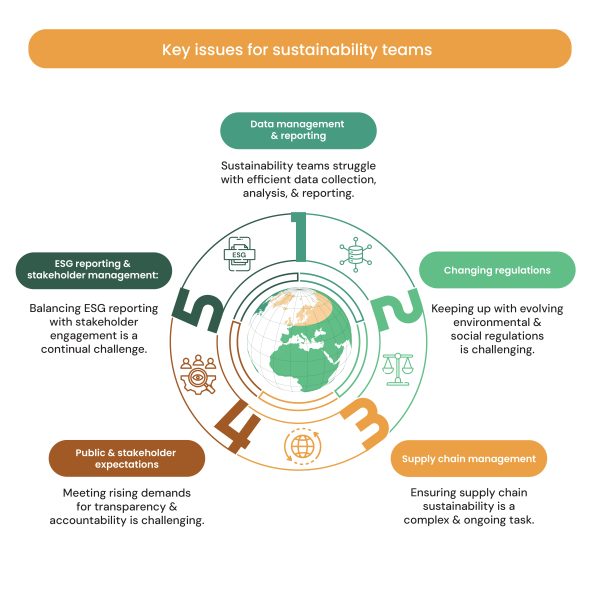Can sustainability efforts reshape the corporate future?
As the first half of 2024 passes, the significance of sustainability has reached unprecedented levels. With customers increasingly relying on eco-conscious brands, businesses must be more aware and incorporate sustainability into their operations. Emerging regulations demanding transparency and authenticity have led companies to prioritise genuine sustainability practices. Addressing sustainability helps mitigate risks associated with resource scarcity (such as water and raw materials), climate change impacts, and shifts in consumer behaviour towards more eco-friendly products.
Embedding ESG standards in business
ESG factors are vital among the sustainability trends in 2024. Beyond customers, investors are also demanding greater transparency and accountability. This has increased the need for environmental stewardship, social responsibility, and ethical governance. As a result, companies are beginning to demonstrate their ESG commitments more clearly. ESG is a vital strategic pillar that empowers companies to demonstrate their commitment to sustainability and ethical operations, thereby leveraging their competitive edge. Regulatory pressure and the growing demand from investors and consumers for responsible investing have spurred the growth of ESG investment.

The inevitability of traceability in sustainable business
- Consumer trust and transparency: Modern consumers demand transparency regarding the ethical and environmental impact of the products they buy. Traceability provides this information, building trust and loyalty among customers.
- Regulatory compliance: Increasingly stringent ESG regulations require detailed supply chain reporting. Traceability systems help businesses meet these requirements, avoid penalties, and maintain their licence to operate.
- Risk management: Traceability helps companies identify and mitigate supply chain risks. With a clear view of suppliers and processes, businesses can quickly address issues like human rights violations, environmental damage, or supply chain disruptions, preventing scandals and financial losses.
- Sustainability goals: Achieving goals like reducing carbon emissions, minimising waste, and ensuring fair labour practices requires detailed supply chain data. Traceability provides this data, helping measure progress, set targets, and implement effective strategies.
Supporting sustainability team with AI-powered RightOrigins
- Data management: RightOrigins allows you to securely upload compliance and sustainability data that is organised and indexed by AI and our team for easy access and reporting.
- Real-time updates: Automated alerts from RightOrigins keep sustainability teams informed about data anomalies, compliance deadlines, and potential issues related to changing regulations.
- Supplier transparency: RightOrigins helps businesses to track and analyse the sustainability practices of suppliers, promoting transparency and ethical sourcing.
- Supplier collaboration: Our platform facilitates collaboration with suppliers, fostering relationships that support sustainability goals and initiatives.
- Transparent communication: RightOrigins facilitates transparent communication of sustainability efforts and achievements to the public and stakeholders.
- Enhanced reputation: By ensuring transparency and providing timely updates, RightOrigins helps enhance corporate reputation and build trust with stakeholders.
Conclusion
As we enter the second half of 2024, sustainability has become integral to corporate strategy. Customers increasingly prefer eco-conscious brands, and investors demand transparency and accountability. Furthermore, investors require businesses to provide measurable and proven evidence of their sustainable efforts, spurring companies to prioritise sustainability and transparency. On the other hand, sustainability teams face significant challenges, including data management, changing regulations, supply chain complexities, and stakeholder expectations.
RightOrigins, our AI-powered Supply Chain Traceability and ESG Intelligence suite, supports sustainability teams with efficient data management, real-time updates, supplier transparency, and clear communication of sustainability efforts. Our platform promotes transparency and ethical sourcing by tracking and analysing suppliers’ sustainability practices.
RightOrigins also allows businesses to securely upload data requests and queries from customers and regulators, converting these into digital, shareable response links for future use. This streamlines data management and ensures consistent communication, providing sustainability teams with real-time insights and enhanced supplier transparency. Overall, RightOrigins helps businesses navigate sustainability challenges effectively.
